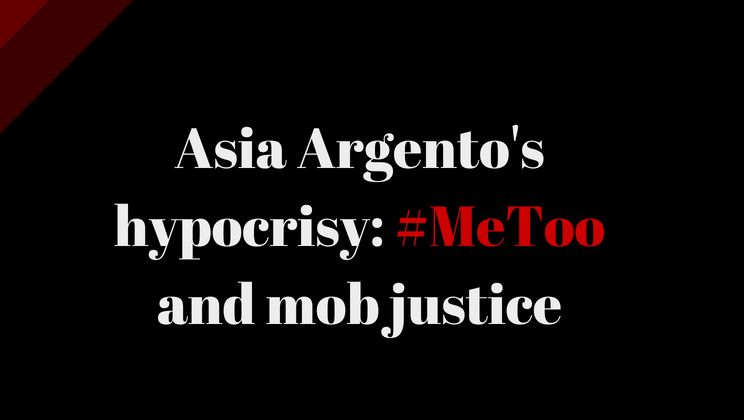Asia Argento’s hypocrisy: #MeToo and mob justice
Posted by Josh Taylor / August 28, 2018
The #MeToo movement has been a wild ride since it began in October of 2017. In the beginning, the movement brought down Harvey Weinstein, who by all accounts was a sexual predator of the most despicable variety. Weinstein used his power and influence to force younger actresses to engage in sexual behaviors. Kevin Spacey was next to fall––and how mighty his fall was. His last movie made a laughable $126. Then Louis C.K. Dan Harmon, co-creator of Rick and Morty, openly apologized for his behavior towards a writerwas inspired by the movement and , who called his apology a “master class in How to Apologize.” Change was in the air––unrepentant harassers were falling, repentant ones were admitting their transgressions.
But the movement seemed to turn a corner when Aziz Ansari was anonymously accused of sexual assault. His accuser spoke anonymously but forcefully, and the encounter she described struck supporters of the #MeToo movement differently. Some influential women believed that the anonymous accusation went too far. The encounter she described could have been easily avoided simply by communicating with Ansari, critics claimed.
One such critic––and she has been a long time critic, so she’s not following the fad here––is scholar Camille Paglia. Paglia believes that some of what has been called sexual assault is a miscommunication of expectations at best or extreme naiveté at worst. “”We’re not talking about sexual assault,” she says of college sexual assault cases, “We’re talking about, often in the case of undergraduates, we’re talking about both individuals are drunk. The men are looking for sexual experience. The women aren’t sure what they want … What I’ve said from the start, and I maintain I’m correct: a girl who goes to a fraternity party and is asked by a young man, would you like to go up to my room — I still maintain to this day that a woman who says yes is signaling she is ready for sex.” The connection with the Ansari case is clear.
Some feminists and #MeToo supporters believe that the Ansari accuser wielded the power of the #MeToo movement irresponsibly and, ultimately, unjustly. The Ansari case revealed that the definition of sexual assault is not as clear cut as we originally assumed. There is no single line between sex and sexual assault. Instead, there are myriad lines that change from situation to situation. And even the situations change in the retelling. What seemed one thing in the head of the moment seems something else in the cold light of day.
Although sexual situations are confusing, sometimes to the point of impossibility, the consequences of accusations are anything but. In most cases––Ansari being the notable exception––once someone has been accused of sexual assault in the vein of the #MeToo movement, they’re tried in the court of public opinion. And that court is far from impartial.
This reminds me of one of my all-time favorite TED talks, “How One Tweet Can Ruin Your Life.” In the talk, Jon Ronson describes how one woman’s Twitter joke went viral in the worst way. She fired off the joke and then turned her phone on airplane mode for a long flight. By the time she landed, her reputation had been publicly tried and executed. The video is worth a watch, and it explains how we use principles of social justice as carte blanche to crucify our societal scapegoats.
But that’s the thing about scapegoat murders. They’re inherently unjust. Recently, Italian actress and #MeToo leader Asia Argento was accused of doing the very thing that Harvey Weinstein was accused of: using her power to coerce younger actors into sex and then silence. There has been backlash, of course, but people seem much more willing to give her the benefit of the doubt and start conversations, rather than immediately attack.
Jordan Peterson, the polarizing popular intellectual, tweeted this:
Today in the "he who lives by the sword" file: https://t.co/zdMdKCXj5Q pic.twitter.com/nGtQJjuAX6
— Jordan B Peterson (@jordanbpeterson) August 20, 2018
Whatever you think of Peterson (which is probably incorrect, as we argued in this piece about Peterson), he’s right. Asia Argento helped start a conflagration that has grown out of control. It came back to bite her, and now she is a social pariah. For now, some are defending her or hedging their language––which itself is an example of how unjust and biased public shaming mobs are. Eventually, though, she’ll be next on the chopping block, if not amongst true #MeToo patriots then amongst the enemies they have created. Soon, the #MeToo movement will fade and there will be another movement that crucifies its victims to slake our blood thirst.
Let’s end with another Bible verse to match Peterson’s: The rain falls on the just and the unjust alike. When we put justice, patience, and fairness on hold for the sake of satiating our bloodlust, then everyone is a potential scapegoat whether they are guilty or innocent.
It’s time we come to grips with our unhealthy addiction to social media scapegoating, at the very least because we could be the next victim of the mob.
nice. keep it up 🙂